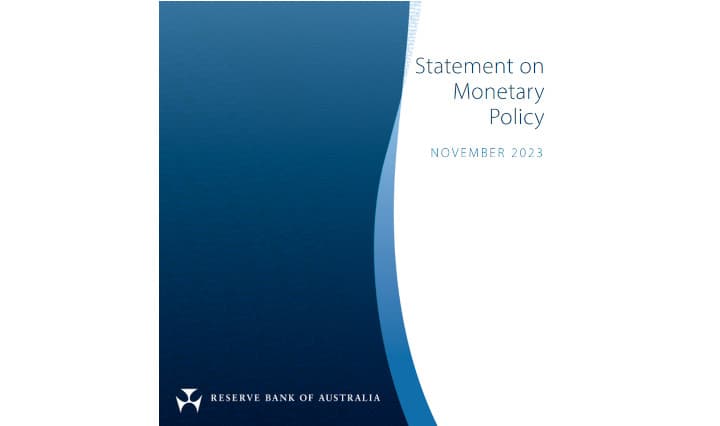Inflation Alert! Extreme and deadly floods close rail lines in Europe for months or longer and Union Pacific suspends inbound international container shipments to Chicago for a week.
Articles reviewed:
https://apnews.com/article/europe-floods-954655c9382a9b8c12a230bdd8cd5b3e
https://www.cnn.com/europe/live-news/deadly-flooding-in-europe-07-16-21/index.html
https://www.bbc.com/news/world-europe-57846200
First and foremost, the loss of life from this flooding is tragic. At least 160 people have died so far:
The death toll in western Germany’s Rhineland-Palatinate state, home to the badly hit Ahrweiler county, rose to 98. Another 43 people were confirmed dead in neighboring North Rhine-Westphalia state. Belgium’s national crisis center said the country’s confirmed death toll rose to 27.
“A lot of people have lost everything they spent their lives building up — their possessions, their home, the roof over their heads,” German President Frank-Walter Steinmeier said after meeting rescue workers and others in the town of Erftstadt.
“It may only be possible to clear up in weeks how much damage needs to be compensated,” he said.
Steinmeier said that people in the affected areas need continuing support.
“Many people here in these regions have nothing left but their hope, and we must not disappoint this hope,” he said.
Wow. My heart goes out to everyone impacted by this. However. life and personal property are not the only things destroyed in this flooding.
In hardest-hit Germany (destruction and loss of life), some rail lines, again built following river valleys, have been completely washed out. In total, the German national railroad Deutsche Bahn has reported 600 kilometers (more than 370 miles) of tracks and 80 stations are impassable.
The worst affected route along the valley of the river Ahr from Remagen to Ahrbrück has seen around 12.5 miles of its 18-mile length destroyed by floodwater, with all seven bridges destroyed where the line crossed from one side of the river to the other. The town of Schuld, which has been seen on TV screens across the world, lies a few miles upstream of Ahrbrück in the same river valley (the rail line in this area closed in 1973); over 110 people were killed by the floods in this region alone. The German government has promised emergency funding for flood-damaged areas but has already said it is likely to take years to rebuild the worst damaged areas and their road and rail infrastructure.
Like the US and Canadian rail companies we have reviewed, European rail companies are also having to contend with climate change
The intensity of the flooding and sheer amount of water — with the consequent damage and loss of life — has been characterized as exceptional, with the consensus view in Germany that this is due to changes in climate and weather patterns.
While it is my understanding many of Germany’s big rivers, (As an American I am sad to say I can only confidently name the Rhine or the Danube from history class?) routinely flood, this has historically been seasonal, during the spring, when snow melting fills the rivers.
My understanding is most big cities on these rivers are built to either contain the flooding or to manage it (gotta love how we can engineer around stuff!).
However, what is so different this time, with climate change to blame suspected by local officials, is that the flooding was so intense and further upstream, where rivers normally no more than small streams in summer became raging waters. I take this to mean this is happening in areas it doesn't traditionally and they do not have the infrastructure in place to mitigate, which amplifies the destruction?
Rail companies have to be aware of the danger to their networks caused by climate change with torrential rain becoming more common, overwhelming tracks or structures such as bridges as we have seen. These events are only going to add to the strain in the transportation system, with rates going up to move less volume, tightening the screw further for more inflation.
Union Pacific suspends inbound international container shipments to Chicago for a week
https://www.freightwaves.com/news/up-temporarily-stopping-eastbound-container-service-to-chicago
The 7-day suspension went into place YESTERDAY. The terminal is clogged largely due to reasons feeding into inflation: labor shortages and pandemic-related restrictions have slowed the unloading and loading of containers at customer facilities. That has led to a shortage of chassis and drayage capacity during a period of extreme demand.
The Union Pacific spokesperson said that the railroad is dealing with "significant congestion at our inland intermodal terminals, most notably in Chicago."
"We believe this change will allow the transportation supply chain to begin working off the backlog of Global IV destined trains, while freeing up railcar assets to support import loading needs on the West Coast," the spokesperson said. "We are working closely with the ocean carriers and collaborating wherever possible to improve the health of the supply chain."

https://www.freightwaves.com/news/up-temporarily-stopping-eastbound-container-service-to-chicago
A big issue for the operations in Chicago has been a lack of chassis. Inland port locations are either wheeled or grounded — which just means that the container either sits on a chassis or the ground. And Global IV relies on chassis, Gross said.
"Folks have been hanging on to chassis and boxes longer than normal ... which has had an effect of reducing the velocity of the chassis at the same time that volume has been strong," he said. "And so they basically have been running out of chassis, which is a big problem operationally."
"It appears to me that necessary resilience has been lost," he said. "So the system has become more fragile, and less able to withstand unexpected events."
I think with extreme weather, we will, unfortunately, see more unexpected events, which will ultimately feed the inflation beast.
The entire transportation network is facing spikes in costs and supply shortages, and you can bet the costs will get passed down the line. More fun to look forward to over the coming months. The CPI number from last week is a lie and a joke and inflation is not transitory--as Covid-19, Suez Canal, and Mother Nature all have continued roles to play in seeing it stick around.
All of this pain in the transportation system happening in the backdrop of the Fed still plowing away with $120 billion in assets purchases each month:
$40 billion a month in mortgage-backed securities. This will continue to depress mortgage rates and only continues to add gasoline to the inflation fire.
$80 billion in Treasury securities a month (with policy rates near 0%): represses short-term and long-term interest rates in general, and inflates asset prices and consumer prices, which further DESTROYS the purchasing power of the dollar.
While the rest of the world's banks are acting, the Fed still claims this inflation is “transitory"...
TL:DR - The Dollar losing purchasing power + Inflation = Permanent Loss of purchasing power. Unless one of the many other catalysts triggers the MOASS, I believe inflation is the match that has been lit that will light the fuse of the rocket.


